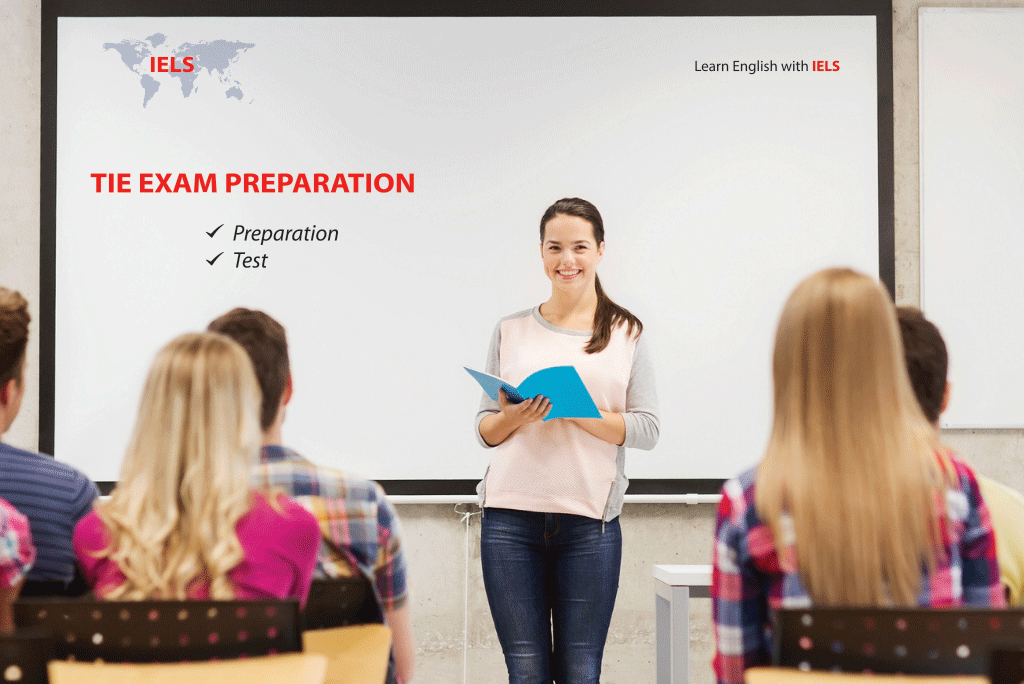English Courses (Junior)
We offer a wide range of English exams: TIE, Trinity , IELTS, Cambridge (YLE, KET, PET, FCE, CAE, CPE, BEC), among others.
General English Course with TIE Exam preparation
Our General English course is designed to make you more proficient in everyday English situations and activities.
The General English course with TIE Exam preparation is designed to cover all the aspects of the English language including the various sub-skills and areas of competence: the basic 4 skills ( Reading, Listening, Writing and Speaking), communicative language (e.g. turn-taking, asking for clarification), types of interaction (e.g. obtaining goods and services, interviewing), and more linguistic skills (e.g. vocabulary range, phonological control). The course aims to combine the usage of English with Vocabulary, Grammar & Pronunciation.
Exam Preparation Course Overview
-
Type of course:
General English with TIE Exam preparation and standards checked to precisely meet the linguistic and organisational excellence imposed by ACELS in Ireland and the British Council in the UK -
Age Group:
12 - 17 Years -
Dates:
June, July and August -
Locations:
Ireland -
Durations:
4 or more weeks -
Extracurricular activities:
Excursions, Leisure and Sport Activities -
Accommodation:
Host Family or College (Full Board)
Junior TIE (JTIE)
Junior TIE is designed for all students attending secondary schools. In all other respects the preparation and conduct of the exam is similar to TIE – any procedural changes are explained in the teachers’ guidelines.
The Test of Interactive English (TIE) is an international EFL exam and can be taken by junior and adult students on either short or long courses in Ireland as well as abroad.
TIE has been designed for all students of all abilities and motivations following either long or short courses in language schools or other educational institutions. TIE is a learner-centred exam which is flexible, i.e., designed to recognise and accommodate the needs and interests of each learner whatever their level of English, age, cultural or educational background. The test is task-based with the content chosen by each individual learner and can therefore be used to assess learners with the following needs and motivations:
- learners of English for general purposes;
- learners of English for vocational, professional or academic purposes;
- learners of English as a second language.
The Test of Interactive English (TIE) is a recognised English Language Examination designed specifically to meet the needs of all students coming to Ireland to learn and improve their English. TIE is designed to assess learners’ communicative and interactive skills in both predictable and spontaneous situations.
It assesses the students’ level of language ability in speaking and writing, with the receptive skills (reading and listening) being tested indirectly through preparation for the test and through the skills required to interact effectively during the test.
TIE Exam Preparation
The TIE is designed for students studying English in Ireland. It assess candidates communicative and interactive skills, both speaking and writing. The test is flexible and learner-centred, based on content chosen by the student. The student prepares for the test by reading a book, following a news story and doing an investigation/project. Students receive their certificate giving their CEFR level within 10 days.
All our Long-term Academic Year students do the TIE. It is also popular with students on the short-term General English course. The beauty of this exam is that you only need to book it 14 days in advance and it is available to be taken every week in in certain venues all-year round. Note: TIE Junior is available for under-18’s
Our in-depth exams support students to develop their language skills and improve their English step by step.
TIE Examinations
TIE is an integrated four skills test of language ability available in two versions, A1-B1 and B2-C2. TIE takes a unique approach to language testing in which Speaking, Reading, Listening and Writing skills are considered to be inter-related and reliant on each other, where receptive language skills support and underlie productive skills – much as they tend to do in real life!
The exam consists of two units: The Speaking exam, within which Listening skills are embedded and the Written exam, within which Reading skills are embedded. The Spoken and Written exams incorporate tasks which candidates can prepare prior to the exams, choosing topics and texts in which they have a personal interest.
CERTIFICATE After taking TIE, each candidate is awarded a certificate recording their 2 grades. This certificate tells candidates their level for each part of the test – oral and written – and awards them a separate grade for each section.
Candidates are awarded the qualification at the level they have achieved on the day of the exam. In other words, candidates are eligible to be awarded either a qualification of a lower or a higher level of attainment than the one they had initially aimed at.
Each Qualification is clearly matched to a level of the CEFR. It is used worldwide to benchmark language ability, and plays a central role in language education and policy.
Dates & Locations
-
Please contact us for information
Locations and Schedule vary depending on level and Exam preparation courses chosen (Monday to Friday)

English Course and Exam Preparation Highlights
English Course and Exam Preparation Highlights
-
English classes per week:
20 or 15 hours (schedule varies depending on level and courses chosen); Monday to Friday -
Level of English:
All levels available, from Elementary (A1) to Advanced (C1) -
Assessments:
Assessment test before the start of the course, weekly progress and End-of-Course Assessments -
No. of Students:
Maximum of 15 students per class (average 10) -
Course Materials:
Standard Workbook included -
Exam Preparation:
TIE Exam preparation -
Teachers:
All our teaching staff are university graduates and qualified to teach English as a foreign language (TEFL) -
Diploma:
TIE Certificate of Attendance and Completion -
Add ons or Options:
Intensive English, Business English, Sport Academies, etc.

More about the Course:
- Weekly Tutorials, advice, tips and guidance on exam topics and strategies.
- Exam practice in class and workshops, study group with experienced teachers.
- Selected training material tailored to students’ needs and the requirements of the exams.
- Regular exam practice in class under teacher supervision
- Simulation tests and mock exams with authentic exam papers, applying the strategies and knowledge from the classroom, under real exam conditions & timings.
- Overall enhancement of learners’ abilities in Reading, Writing, Listening, Speaking and Use of English.
- learners of English for general purposes;
- learners of English for vocational, professional or academic purposes;
- learners of English as a second language.
All of the staff at IELS are committed to offering students the best education during their stay. We inspire students to work diligently to improve in all aspects of the English language.
Our experienced teaching staff are well trained and highly qualified in what they teach. They are up to date with the latest methods in teaching English as a foreign language and combine academic excellence with the sensitivity and receptiveness for each student’s individual needs, talents and potential.
All teachers are university graduates with qualifications in teaching English as a Foreign Language (TEFL) and are respected for their knowledge and professionalism.
Classes are on from 9:30 until 13:00 with a 30-minute break at 11:00. After class, there is a 60-minute lunch break. After lunch, depending on the programme, there will be sports, activities or a cultural trip. Students must be ready at the designated time.
The first day in the college is somewhat different to the rest. Students are advised to arrive at 9:00 to allow for unforeseen delays as they may not be familiar with the bus timetable or the route. At 9:30 there will be a short introduction by the camp manager and principal. After there will be an assessment test, which is used to determine the level of English so students can be placed in the appropriate class.
After the test students meet in the main hall again. Here a staff member will go through the college rules and some other important information. The students are then taken on a tour of the college. At the end of the tour, students will be divided into their appropriate classes and attend the second-morning class until lunch time. After lunch students on the general course go on a familiarisation trip, while students on the specialised sports courses have training.
Please note that all students on “Play Sport and Learn English” programme MUST bring their training equipment with them on the first day.
Students on the familiarisation tour will arrive back to the college by approximately 17:00. For further excursions to the city centre, students staying with the host families, do not return to the college but travel directly home to the host family.
Students on “Play Sport and Learn English” programme will finish training at approximately 17:00 – 17:30.
Students will receive the English course materials and workbooks as part of the programme. After completion of the English course, a Certificate of Attendance will be issued to each student. It certifies the progress that has been made and the level of English reached.

Extracurricular Activities Highlights
-
Half-day Excursions
Students travel to local visitor attractions such as galleries, museums, sports stadiums or other popular sites. -
Full-day excursions:
Students travel to places of interest -
Evening activities:
Karaoke, Barbecue, Sport and Games competitions, Movie Night, Quiz Night, Party Night and Disco, etc.
Read more about:
In addition to classes, students go on half-day cultural trip. These are normally to local visitor attractions such as galleries, museums, sports stadiums or other popular sites.
Full-day excursions, usually on Saturdays, are also part of the programme. Students travel to places of interest, normally outside the city. There are no organised activities on Sundays as many groups, host families or friends like to organise their own day.
Evening activities are held several times every week. These can include discos, Party nights, karaoke, quiz night, sports & games competitions, movie nights, barbecues and much more. Evening activities normally take place between 20:00 and 22:00 but this can vary depending on the activity and age group of the students.
The activities programme provides students with an opportunity to absorb some of the world’s rich heritage in a fun and relaxed way while also allowing students the opportunity to improve their English. This informal and social aspect of the programme is key to improving language skills. It also allows students from different nationalities to get to know each other outside the classroom. Some of the friendships made at “IELS” will last a lifetime.
Accommodation & Supervision Highlights
-
Accommodation:
Host Family Accommodation with selected host families or College Accommodation on full board basis -
Location:
Located in one of the quietest and safe residential areas of the city. -
Internet:
WIFI with access to computer and Internet facilities -
Room type:
Single or twin rooms, students share their accommodation with other students of different nationality (if feasible) -
Assistance:
24/7 emergency phone

Read more about:
Students attending “IELS” should stay with host families. All our families are inspected and carefully selected by our accommodation officers who maintain regular contact with each host family during a student’s stay. Host families are conveniently located to the colleges and most have many years experience looking after students. Accommodation is arranged on a full board basis with packed lunch Monday to Saturday.
Students normally share a room with a student of a similar age but different nationality. Unless specifically requested and if feasible there is only one student of any particular nationality in each family. Students normally travel to classes each day by public transport like bus, DART (suburban train) or LUAS (tram) or TUBE. Private transfers can also be arranged at an additional cost. Living with a host family gives a perspective into Irish or British family life. The interaction with a host family plays a prominent role in developing language skills.
Residence and apartments offer an alternative to the “host family” option for students who wish to immerse themselves and independently in the complete campus and/or local experience.
This type of accommodation offers students a degree of independence and freedom to explore.
All the accommodation used by the Language School students is of extremely high quality. Each bedroom is either situated very close to our modern wash and toilet facilities or, alternatively, has its own en-suite shower room. Each student will have their own wardrobe, drawers, desk and chair.
We have self-catering and catering solutions in place. The catering facilities provide both hot and cold meals and a wide range of snacks.
Weekly Timetable
| SAMPLE WEEKLY TIMETABLE (General English with TIE Exam Preparation ) | |||||||
| TIME | MONDAY | TUESDAY | WEDNESDAY | THURSDAY | FRIDAY | SATURDAY | SUNDAY |
| 9:30-11:00 | CLASS | CLASS | CLASS | CLASS | CLASS | Full day Excursion | Activity day |
| 11:00-11:30 | Morning Break | Morning Break | Morning Break | Morning Break | Morning Break | ||
| 11:30-13:00 | CLASS | CLASS | CLASS | CLASS | CLASS | ||
| 13:00-14:00 | Lunch | Lunch | Lunch | Lunch | Lunch | ||
| 14:30-16:30 | CLASS or Extracurricular Activity | CLASS or Extracurricular Activity | CLASS or Extracurricular Activity | CLASS or Extracurricular Activity | CLASS or Excursion / Sport | ||
| 18:00-19:00 | Dinner | Dinner | Dinner | Dinner | Dinner | ||
| EVENING | Evening Activity | Evening Activity | Evening Activity | Evening Activity | Evening Activity | ||
| The Educational Programme is recognised by the Irish and British Departments of Education. The courses are structured on 5 levels (CEFR) divided into 20 lessons per week. Schools, English courses, teachers, teaching method and learning experience are reviewed, inspected, checked to precisely meet the linguistic and organizational standards imposed by ACELS in Ireland and the British Council in the UK. | |||||||
| * Please note: Schedule is subject to change without notice. | |||||||
Fees
| June, July and August | Accommodation | 3 WEEKS | 4 WEEKS | MORE WEEKS | |||
| General English with TIE Exam Preparation | Host Family | TBQ* | TBQ* | TBQ* | |||
| General English with TIE Exam Preparation | College/Residential | TBQ* | TBQ* | TBQ* | |||
| General English with TIE Exam Remote Preparation | N/A | TBQ* | TBQ* | TBQ** | |||
| * TBQ: To be quoted. ** Please contact us for more information. |
|||||||
Exam Preparation Course
- Assessment Test
- 15 or 20 hours English classes per week
- Maximum of 15 students per class
- All Course Materials
- All levels available, from Elementary (A1) to Advanced (C1).
- Two teachers working alternately with each class
- Certificate of Attendance and Completion
- All our teaching staff are university graduates and qualified to teach English as a foreign language (TEFL)
Extracurricular Activities
- 1 half-day excursion per week
- 1 full day excursion per week
- 3 evening activities per week, such as treasure hunt, karaoke, party night, disco
Accommodation and Supervision
- Host Family Accommodation with selected families on half or full board basis
- College Residential Accommodation on full board basis
- Located in one of the quietest residential areas of the city
- Access to computer and Internet facilities
- Room type: Single or twin rooms (students share with a student of different nationality, when possible).
- 24/7 emergency phone
Not Include:
- Flights or other transport to and from school
- Airport transfers to Homestay / Residence or College and vice versa
- Subscription to public transport service
- Travel and Medical and Health insurance
- Examination Fees
- All that is not included in “the price includes”
Intensive English and Exams Preparation
- On request, 1 to 4 Intensive Exam Preparation
Special Courses
- On request, Sport Academy
- On request, Experiential Learning
- On request, Work Experience
- On request, more
Accommodation and Meals
- Extra days with host family: : TBQ Eu per day
- Half or Full Board from Monday to Friday at the College canteen: TBQ Eu per week
Transport
- Individual Student Arrival and Departure airport transfers: TBQ Eu per person each way (reductions available for groups)
- Bus & Dart pass: 2 weeks 70,00 Eu, 3 weeks 94,00 Eu, 4 weeks 119,00 Eu
- Bus & Luas pass: 2 weeks 70,00 Eu, 3 weeks 94,00 Eu, 4 weeks 119,00 Eu
- Bus & Tube pass: 2 weeks TBQ* Eu, 3 weeks TBQ* Eu, 4 weeks TBQ* Eu
Apply now
If you wish to receive more information please fill in the form below.
Enrolment Process
In-person format
Step 1.
Step 2.
IELS Review Application
Step 3.
IELS sends offers via email and meetings
Step 4.
Step 5.
Booking Confirmation
Step 6.
Step 7.
Step 8.
Departure
Online/Remote/Virtual format
Step 1.
Step 2.
IELS Review Application
Step 3.
IELS sends offers via email and meetings
Step 4.
Step 5.
Booking Confirmation
Step 6.
IELS starts coaching and mentoring
Step 7.
Programme starts
Blended formula
Step 1.
Step 2.
IELS Review Application
Step 3.
IELS sends offers via email and meetings
Step 4.
Step 5.
Booking Confirmation
Step 6.
IELS starts coaching and mentoring
Step 7.
Step 8.
Departure


